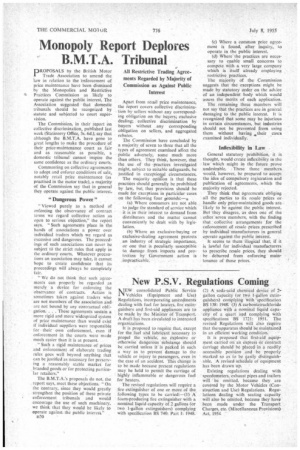Monopoly Report Deplores B.M.T.A. Tribunal
Page 66

If you've noticed an error in this article please click here to report it so we can fix it.
All Restrictive Trading Agreements Regarded by Majority of Commission as Against Public Interest PROPOSALS by the British Motor Trade Association to amend the law in relation to the 'enforcement of price maintenance have been dismissed by the Monopolies and Restrictive Practices Commission as likely to operate against the public interest. The Association suggested that domestic tribunals should be recognized by statute and subjected to court supervision.
The Commission, in their report on collective discrimination, published last week (Stationery Office, 3s. 6d.), say that although the B.M.T.A. have gone to great lengths to make the procedure of their price-maintenance court as fair and as reasonable as possible, a domestic tribunal cannot inspire the same confidence as the ordinary courts.
Commenting on collective agreements to adopt and enforce conditions of sale, notably retail price maintenance (as practised in the motor trade), a majority of the Commission say that in general they operate against the public interest,
"Dangerous Power"
" Viewed purely as a method of enforcing the observance of contract terms we regard collective action as open to serious objection," the report says, " Such agreements place in the hands of associations a power over individual traders which we regard as excessive and dangerous. The proceedings of such associations can never be subject hi the strict rules that apply in the ordinary courts, Whatever precautions an association may take, it cannot hope to create confidence that its proceedings will always be completely fair.
" We do not think that such agreements can properly be regarded as merely a device for enforcing the observance of contracts. Action is sometimes taken against traders who are not members of the association and are not bound by any contractual obligation. . . These agreements sustain a more rigid and more widespread system of price maintenance than would exist if individual suppliers were responsible for their own enforcement, even if enforcement in the courts were made much easier than it is at present.
"Such a rigid maintenance of prices and enforcement of elaborate trading rules goes well beyond anything that can be justified as necessary for preserving a reasonably stable market for branded goods or for protecting particular retailers."
The B.M.T.A.'s proposals do not, the report says, meet these objections. "On the Contrary, since they would greatly strengthen the position of these private enforcement tribunals and would encourage the use of such machinery, we think that they would be likely to operate against the public interest."
D20 Apart from retail price maintenance, the report covers collective discrimination by sellers without any corresponding obligation on the buyers; exclusive dealing; collective discrimination by buyers without any corresponding obligation on sellers, and aggregated rebates.
The Commission have concluded by a majority of seven to three that all the types of agreement examtned affect the public adversely, some much more than others. They think, however, that the use of the • practices investigated might, subject to suitable safeguards, be justified in exceptional circumstances.
• The majority opinion is that these practices should generally be prohibited by law, but that provision should be made for exceptions in particular cases on the following four grounds:—.
(a) Where consumers arc not able to judge the standard of service which it is in their interest to demand from distributors and the matter cannot conveniently be dealt with by legislation.
(b) Where an exclusive-buying or exclusive-dealing agreement protects an industry of strategic importance, or one that is peculiarly susceptible to damage from imports and protection by Government action is impracticable. (c) Where a common price agreement is found, after inquiry, to operate in the public interest.
(d) Where the practices arc necessary to enable small concerns to compete with a very large company which is itself already employing restrictive practices.
The Majority of the Commission suggests that the exceptions might be made by statutory order on the advice of an independent body which would assess the merits of each application.
The remaining three members will not say that the practices arc in general damaging to the public interest. It is recognized that some may be injurious in certain circumstances, but industries should not be prevented from using them without having ,their ,cases examined individually.
Inflexibility in Law
General statutory prohibition, it is thought, would create inflexibility in the Jaw which might in the future prove undesirable. These three members would, however, be prepared to accept the idea of compUlsory registration and publication of agreements, which the majority rejected.
They think that agreements obliging all the parties to fix resale prices or handle only price-maintained goods are likely to be against the public interest. But they disagree, as does one of the other 'seven members, with the finding that collective arrangements for the enforcement of resale prices prescribed by individual manufacturers in general operate against the public interest.
It seems to them illogical that; if it is lawful for individual manufacturers to prescribe resale prices, they should be debarred from enforcing maintenance of those prices.




















































































































